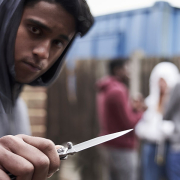Preventing Youth Violence: A Void of Identity and Belonging

A profound identity crisis lies at the heart of many young radicals’ journeys. These are often second- or third-generation immigrant youth who grow up feeling caught between worlds “belonging nowhere,” fully accepted by neither their parents’ culture nor British society.
The result is a painful marginalisation. They feel British outsiders in their own homeland and yet not connected to their ancestral roots either. Who am I? Where do I fit? Unanswered, these questions fester into alienation and insignificance.
Research in behavioural science has confirmed what these youths’ stories tragically illustrate. When young people identify with neither their heritage culture nor their country of birth, they experience a loss of meaning and belonging.
One seminal study termed this state “belonging nowhere” and found it to be a key driver of radicalisation risk. Experiences of discrimination and exclusion make things even worse, pushing marginalised youth to seek purpose elsewhere.
Violent extremist groups eagerly supply that purpose, offering a simplified identity “holy warrior,” “jihadi bride” and a sense of brotherhood or sisterhood that these young people desperately crave. In the words of researchers, “Radical Islam provides a sense of dignity and purpose to youth that often feel marginalised… They find a badly needed sense of identity derived from the greater Islamic community and its fixed value system.”
Youth Seeking Identity in Extremism: Real-Life Stories
Across the UK, we have seen real-life examples of this identity vacuum feeding extremism. Shamima Begum, for instance, was a 15-year-old schoolgirl from East London who never quite felt she belonged. By her mid-teens, she was drifting toward an extremist interpretation of Islam seeking a clear identity and community.
In 2015, Shamima and two friends all bright students by school reports vanished to join ISIS in Syria. Why would a British-born girl choose such a path? In part, she was “lured by IS propaganda” promising sisterhood, purpose, and belonging in the self-declared Caliphate.
At home, she had apparently felt like an outsider. In ISIS, she thought she had found her people. This illusion of belonging was so powerful she swapped her A-level courses for life as a jihadi bride on a distant battlefield.
Consider also the case of Jermaine Lindsay, one of the 7/7 London bombers. Born in Jamaica, Lindsay moved to Britain as a young child. By 15 he had converted to Islam and adopted the name Abdullah.
Friends say he was searching for greater meaning and a community to accept him, beyond the racial isolation and turbulence of his upbringing. In the predominantly white town where he lived, he struggled to find a sense of home. Embracing Islam and later violent jihad gave him a new identity that felt empowering.
Lindsay infamously declared before the 2005 attacks that he and others were “forsaking everything for what we believe”. This chilling resolve grew from years of feeling like he belonged nowhere in British society.
Even among the so-called “ISIS Beatles” – a cell of four British militants in Syria, we see identity crises at play. Three of the four were children of immigrants or immigrants themselves. Mohammed Emwazi, known as “Jihadi John,” was born in Kuwait and moved to London as a child.
El Shafee Elsheikh fled Sudan with his family in the 1990s and grew up in West London. Alexanda Kotey was born in London to Ghanaian and Greek Cypriot parents. These young men were British, yet treated as perpetual outsiders.
Emwazi, for example, experienced constant tension over his Muslim identity in the UK, even alleging harassment by MI5 more on that in the next article. Feeling alien in the only country they knew, they gravitated toward a radical Islamist identity that seemed to offer them pride and brotherhood. All four joined ISIS and revelled in their new persona as “holy warriors,” brutally terrorising captives a horrifying testament to how completely an identity void can be filled by extremist ideology.
The Painful Paradox of “Homegrown” Hatred
It is both heartbreaking and telling that so many “homegrown” terrorists profess hatred for the very country that raised them. Their journeys often begin with feeling rejected by Britain. For instance, a former friend of Elsheikh noted that after his older brother was jailed, “both of them were lost. They were vulnerable to radicalization.”
Lacking a positive identity or belonging, Elsheikh fell under the sway of a radical preacher who gave him new answers to who he was casting him as a soldier for Islam. Similarly, Mohammad Sidique Khan the 7/7 ringleader felt more kinship with the global Muslim “ummah” than with his fellow Britons.
In his martyrdom video, the Yorkshire-born Khan spoke in a chillingly estranged tone to British society: “Your democratically elected governments continuously perpetuate atrocities against my people… until we feel security, you will be our target.”. He no longer saw Britain as home at all “my people,” he said, were elsewhere, and he was at war with his birth country.
Such cases lay bare the paradox of identity-based radicalisation: when young citizens feel they have no home here, they become willing to burn their own house down. A UK government analysis of foreign fighters found more than 800 Britons travelled to join ISIS or similar groups, “a majority of them under the age of 30.”.
These were youth who grew up under the Union Jack yet felt so disconnected that they gave their lives to an ultra-violent anti-Western cause. As one academic study put it, “second and third generation immigrants have increasingly turned to militant Islam, radicalising against the very society in which they were born and raised.” This identity-driven alienation is not an excuse for their atrocities, but it is a crucial part of the explanation.
Reclaiming a Sense of Belonging
If we are to prevent future tragedies, we must address this identity crisis head-on. That means ensuring young Britons from all backgrounds feel valued and included as full members of British society. Initiatives that promote cross-cultural understanding, mentorship, and pride in one’s nuanced identity e.g. being both British and Muslim, both English and Somali are essential. Experts argue that building a sense of meaningful belonging for marginalised youth is a powerful inoculation against extremist recruitment. When a teenager feels seen and accepted in their local community, they are far less likely to seek solidarity in online echo chambers of hate.
Communities and schools have a role here too. Programs that bring together youth of different ethnic or religious groups for common projects sports, arts, service can help dissolve the “us vs them” narrative that extremists peddle.
Schools can incorporate discussions on identity and belonging, helping second-generation students navigate their dual heritage with pride rather than shame. Role models successful Britons of immigrant background can be spotlighted to show that one can embrace multiple identities and still be fully “British.” For example, the stories of entrepreneurs, athletes, or artists from minority communities who celebrate both their Britishness and their cultural roots can inspire young people that they too belong in the UK story.
Ultimately, curbing identity-based radicalisation means widening the circle of inclusion. It means telling every child in Britain especially those from marginalised groups that “You are one of us. This country is yours, and you are valued here.” If we fail to do so, we leave an emotional void that violent ideologies are all too ready to fill.
As one study concluded, “lack of a sense of belonging” coupled with discrimination can drive youth toward radical groups that “promise meaning and life purpose.” We cannot let those false promises continue to win. By addressing the identity crises of our vulnerable youth, we deny extremism its easiest prey and strengthen the inclusive fabric of our nation.



